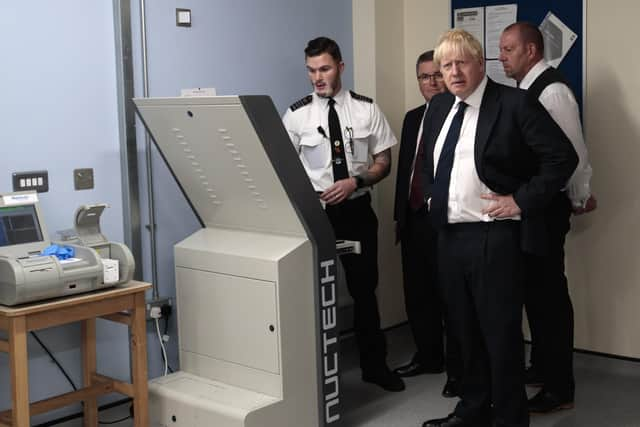Report on stemming flow of drugs into prisons highlights how Leeds inmates carry out maintenance work
and live on Freeview channel 276
The number of prisoners developing a drug problem in custody has more than doubled in the last five years, according to research by think tank Reform.
It found 14.8 per cent of inmates developed a drug problem while behind bars in 2018/19 - up from 6.4 per cent in 2013/14.
Advertisement
Hide AdAdvertisement
Hide Ad

The think tank says much of the prison estate is not equipped to disrupt drug supply and security standards vary from prison to prison.
Its report - The Prison System: Priorities for Spending - warns that while a one-off pledge of £100m made by Prime Minister Boris Johnson last summer could significantly improve security, recurring spending on staffing as well as new equipment will be required in the long term.
Among its six recommendations are devolving a portion of the facilities management budget to prison governors, allowing minor maintenance problems to be addressed more quickly.
Report author Aidan Shilson-Thomas points to the example of HMP Leeds, where staff and prisoners work in collaboration to complete minor facilities tasks.
Advertisement
Hide AdAdvertisement
Hide AdFollowing hislatest inspection of the Category B prison, HM Chief Inspector of Prisons Peter Clarke highlighted the approach as an example of good practice.
He wrote: "An excellent initiative was the small group of staff and prisoners called ‘Q-branch’, who carried out maintenance tasks of varying kinds around the prison.
"They clearly took great pride in their work, and their impact was very impressive when the small size of the unit was taken into account."
Despite it being a Victorian prison and one of the most overcrowded in the country, he found the prison - known locally as Armley - was generally clean and most cells were in a reasonable condition.
Advertisement
Hide AdAdvertisement
Hide AdBut levels of violence were deemed to be "far too high" and around a third of prisoners tested positive for drugs during random testing.
In August 2018, Leeds was named as one of 10 troubled prisons that would benefit from a £10m blitz on drugs and violence.
Measures funded included drug-detection dogs, body scanners and improved perimeter defences.
Reform's report says the government should now focus on four priorities if it is to successfully address issues such as rising assaults on staff and prisoners, rising rates of self-harm and increased drug use within prisons.
Advertisement
Hide AdAdvertisement
Hide AdThose priorities are more effective sentencing policies, creating a fit-for-purpose prison estate, improving prison safety, and developing the workforce.
The think tank argues that current sentencing policy is counter-intuitive, with the continued use of short-term prison sentences contributing to destabilising churn and overcrowding in the prison population.
Mr Shilson-Thomas said: “There must always be a place in prison for those who commit serious crimes. However, prison must also be an opportunity for inmates to change their behaviour.
“Stabilising the system means stemming the flow of drugs, reducing overcrowding, fixing the crumbling estate and improving officer retention. Its long-term sustainability requires a serious conversation about how many people we lock up and for how long.
Advertisement
Hide AdAdvertisement
Hide Ad“Failing to act will mean poorer social outcomes, more re-offending and ultimately huge costs to the taxpayer.”
A Ministry of Justice spokesman said: “Illicit substances pose huge challenges in our prisons which is why we are investing £100mn in airport-style security - including x-ray body scanners - to stop them getting in.
“This is part of our £2.75bn investment to make jails safer for offenders and staff, while working closely with healthcare providers to ensure prisoners have the support they need to live drug-free upon release.”
